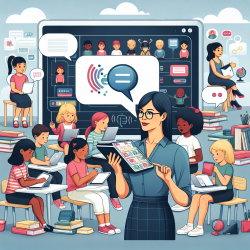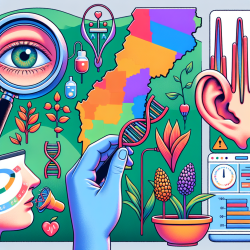Revolutionizing Speech Therapy with Technology: A New Era for Schools
As educational psychologists, the pursuit of creating optimal learning environments is at the heart of our work. The integration of technology in speech therapy is not just a trend; it's a transformative approach that is reshaping how we support children in schools. With the advent of online therapy services, like those provided by TinyEYE, schools are witnessing unprecedented improvements in student outcomes.
The Power of Online Therapy
Online therapy has emerged as a powerful tool in the arsenal of educational psychologists. The data is compelling: students receiving online speech therapy demonstrate significant progress in communication skills, often outpacing their peers in traditional settings. This is largely due to the personalized, data-driven approach that online platforms can offer.
Online therapy services provide:
- Flexibility: Sessions can be scheduled at convenient times, ensuring consistent therapy without disrupting academic schedules.
- Access to Experts: Schools can connect with a broader pool of qualified speech therapists, overcoming geographical limitations.
- Data-Driven Insights: Online platforms often include robust tracking and reporting tools, enabling therapists to tailor interventions based on real-time data.
Enhancing Educational Outcomes
Incorporating technology into speech therapy not only enhances the therapy experience but also aligns with the broader educational goals of fostering self-actualization in students. By providing children with the tools they need to communicate effectively, we empower them to reach their full potential.
Moreover, the use of technology in speech therapy staffing allows for efficient allocation of resources. Schools can better manage their therapy needs by leveraging online platforms to fill gaps in staffing, ensuring that no child is left without the support they need.
Opportunities for Educational Psychologists
For educational psychologists, the rise of online therapy jobs presents exciting opportunities to engage with cutting-edge practices. By participating in or facilitating online therapy programs, psychologists can expand their skill sets and contribute to a growing field that is making a tangible difference in the lives of children.
As we continue to explore the possibilities that technology offers, it is crucial to remain focused on the data. By continually assessing the impact of online therapy through rigorous data analysis, we can ensure that our approaches remain effective and aligned with the needs of our students.
Conclusion
The integration of technology in speech therapy is not merely an innovation; it is a paradigm shift that is transforming educational outcomes. By embracing these advancements, educational psychologists can play a pivotal role in creating environments where children are not only supported but are truly thriving. With services like those offered by TinyEYE, the future of speech therapy in schools is brighter than ever.










